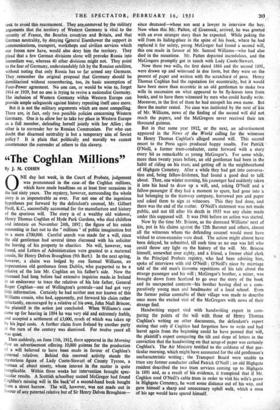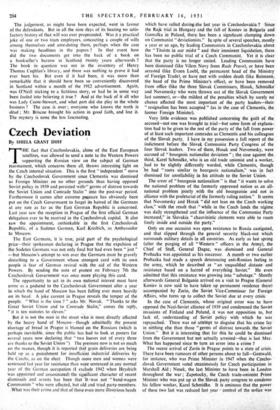“The Coghlan Millions"
By J. M. COHEN
0 NE day last week, in the Court of Probate, judgement was pronounced in the case-of the Coghlan millions, which have made headlines on at least four occasions in the last sixty years. The mystery, however, surrounding the whole story is as impenetrable as ever. For not one of the ingenious hypotheses put forward by the defendant's counsel, Mr. Gilbert Paull, K.C., successfully accounted for the manufacture and history of the spurious will. The story is of a wealthy old widower, Henry Thomas Coghlan of Hyde Park Gardens, who died childless and intestate on November 24th, 1892; the figure of his estate amounting in fact not to the " millions " of public imagination but to a mere £700,000. Careful search was made for a will, since the old gentleman had several times discussed with his solicitor the leaving of his property to charities. No will, however, was found, and Letters of Administration were granted to a maternal cousin, Sir Henry Delves Broughton (9th Bart.). In the next spring, however, a claim was lodged by one Samuel Williams, an impecunious old gentleman from Dublin, who purported to be a relative of the late Mr. Coghlan on his father's side. Now the deceased had long before had extensive inquiries made. in Ireland in an endeavour to trace the relatives of his late father, General Roger Coghlan—one of Wellington's generals—and had got very little information. Certainly he had neither met nor known of this Williams cousin, who had, apparently, put forward his claim rather reluctantly, encouraged by a relative of his own, John Niall Briscoe, the plaintiff in the action just concluded. When Williams's case came up for hearing in 1894 he was very old and extremely feeble, and accepted a settlement of £3,000, much of which was taken up by his legal costs, A further claim from Ireland by another party at the turn of the century was dismissed. For twelve years all was quiet.
Then suddenly, on June 11th, 1912, there appeared in the Morning Post an advertisement offering 10,000 guineas for the production of a will believed to have been made in favour of Coghlan's paternal relatives. Behind this renewed activity stands the mysterious figure of Lady Coote-Stewart of County Tyrone, a uoman of about ninety, whose interest in the matter is quite inexplicable. Within three weeks her intervention brought spec- tacular results. A Scottish schoolboy named McGregor had found Coghlan's missing will in the bacrof a second-hand book bought from a street barrow. The will, however, was not made out in favour of any paternal relative but of Sir Henry Delves Broughton—
since deceased—whose son sent a lawyer to interview the boy. Now when this Mr. Patten, of Greenock,. arrived, he was greeted with an even stranger story than he expected. While poking the will from its hiding-place in the spine of his book, where he had replaced it for safety, young McGregor had found a second will, this one made in favour of Mr. Samuel Williams—who had also died in the meantime. Mr. Patten departed incredulous, and the McGregors promptly got in touch with Lady Coote-Stewart.
Now these two wills, the first dated 1884 and the second 1891, were drawn up and witnessed in due form, but they were on the poorest of paper and written with the scratchiest of pens. Henry Thomas Coghlan had the reputation for eccentricity, but it would have been more than eccentric in an old gentleman to make two wills in succession on what appeared to be fly-leaves torn from books, and to have them witnessed by men who could hardly write. Moreover, in the first of them he had misspell his own name. But there the matter rested. No case was instituted by the next of kin of Mr. Williams, news of the finding of the second will did not reach the papers, and the McGregors never received their ten thousand guineas.
But in that same year 1912, or the next, an advertisement appeared in the News of the World calling for the witnesses to Henry Thomas Coghlan's alleged second will. This second resort to the Press again produced happy results. For Patrick O'Neill, a former tram-conductor, came forward with a story every bit as remarkable as young McGregor's. For some while, more than twenty years before, an old gentleman had been in the habit of riding on his tram, and getting off in the neighbourhood of Highgate Cemetery. After a while they had got into conversa- tion and, being fellow-Irishmen, had found a good deal to talk about. Then, one winter morning, his passenger had suddenly taken it into his head to draw up a will, and, asking O'Neill and a fellow-passenger if they had a moment to spare, had gone into a hut belonging to the tramway company, borrowed pen and paper and asked them to sign as witnesses. This they had done, and there was the end of the matter. O'Neill's statement was not made public, and not till after his death in 1935 was any claim made under this supposed will. It was 1946 before an action was started.
Now by the time Mr. Briscoe, as the deceased Williams' next of kin, put in his claims against the 12th Baronet and others, almost all the witnesses whom the defending counsel would most have wished to cross-examine were dead. The action might almost have been delayed, he submitted, till such time as no one was left who could throw any light on the history of the will. Mr. Briscoe himself, somewhat over eighty, and a friend, a former chief clerk in the Principal Probate registry, who had been advising him, spoke of interviews with old O'Neill ; O'Neill's niece by marriage told of the old man's tiresome repetitions of his tale about the strange passenger and his will ; McGregor's brother, a miner, was brought down from Scotland to go over the story of the book and its unexpected contents—his brother having died as a com- paratively young man and headmaster of a local school. Even the former police constable of their village was made to describe once more the excited visit of the McGregors with news of their strange find.
Handwriting expert vied with handwriting expert in com- paring the points of the will with, those of Henry Thomas Coghlan's writing on other documents, the defendant's expert stating that only if Coghlan had forgotten how to write and had learnt again from the beginning could he have penned that will, the plaintiff's expert comparing the tilt and slope of letters in the conviction that the handwriting on that scrap of paper was certainly Coghlan's. The Air Ministry testified to the coldness of that par- ticular morning, which might have accounted for the old gentleman's uncharacteristic writing ; the Transport Board were unable to trace any former conductor called Patrick O'Neill ; an old Highgate resident described the two tram services coming up to Highgate In 1891 and, as a result of his evidence, it transpired that if Mr. Coghlan used O'Neill's cable tram in order to visit his wife's grave In Highgate Cemetery, he went some distance out of his way, and gave himself a sharp and unnecessary uphill walk, which a man of his age would have spared himself.
The judgement, as might have been expected, went in favour of the defendants. But in all the nine days of its hearing no satis- factory history of that will was ever propounded. Was it a practical joke of one or two tram employees, concocting a couple of wills among themselves and ante-dating them, perhaps when the case was making headlines in the papers ? In that event how did the two documents get into the back of a book on a bookseller's barrow in Scotland twenty years afterwards ? The book in question was not in the inventory of Henry Thomas Coghlan's librat y, and there was nothing to prove it had ever been his. But even if it had been, it was more than remarkable that it should have been so conveniently discovered in Scotland within a month of the 1912 advertisement. Again, was O'Neill sticking to a fictitious story, or had he in some way been fooled into believing it true ? And at the back of it all who was Lady Coote-Stewart, and what part did she play in the whole business ? The case is over ; everyone who knows the truth is dead ; Mr. Briscoe brought his action in good faith, and lost it. The mystery is none the less fascinating.



































 Previous page
Previous page